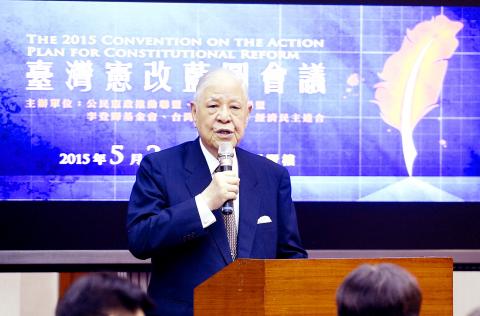Former president Lee Teng-hui (李登輝) yesterday said that there is no such thing as the so-called “1992 consensus” and it “only incurs ridicule” when President Ma Ying-jeou (馬英九) keeps “chanting” it.
The 92-year-old former president attended the 2015 Convention on the Action Plan for Constitutional Reform, co-hosted by several civic groups, including Civil Alliance to Promote Constitutional Reform (CAPCR) and the Lee Teng-hui Foundation, as the “honorary convener” yesterday.
Asked how he views the visit by Chinese Nationalist Party (KMT) Chairman Eric Chu (朱立倫) to Beijing and Chu’s scheduled meeting with Chinese President Xi Jinping (習近平) tomorrow, Lee said Chu went to China “to represent the KMT, [so] it has nothing to do with me nor with Taiwanese; it’s the KMT’s own business.”

Photo: George Tsorng, Taipei Times
“[Chu] is the KMT chairman, and he might want to run for president in the future. As a country’s leader, what is most important is to answer to the needs of Taiwan and Taiwanese,” Lee said. “Don’t follow Mr Ma’s steps in reciting the ‘1992 consensus,’ which he has been unnecessarily repeating for almost 10 years; it’s embarrassing. The attitude of a leader is lacking in his chanting.”
Lee denied that a consensus was reached in 1992 between Taiwan and China, saying Ma’s claim that the “1992 consensus” was the most significant consensus made across the Taiwan Strait was “simply talking nonsense.”
“There is no such consensus,” Lee said, adding that he had asked then-Straits Exchange Foundation (SEF) legal bureau head Shi Hwei-yow (許惠祐), then-SEF deputy secretary-general Chen Rong-jye (陳榮傑) and then-SEF chairman Koo Chen-fu (辜振甫) — who were the delegates to the cross-strait meeting in 1992 — about the meeting and was told there had been no such consensus.
“Why chant something that does not exist? Apparently it is in order to sing the same tune with China,” Lee said. “Taiwan is Taiwan; China is China; the idea of ‘one China’ is an ancient concept. The whole world is talking about ‘one China,’ but Taiwan, as a free, democratic society, should not handle the issue like this.”
Lee called the consensus “something that former Mainland Affairs Council minister Su Chi (蘇起) fabricated to placate the KMT in 2000.”
The “1992 consensus” refers to a supposed understanding reached during the cross-strait talks in 1992 that both Taiwan and China acknowledge that there is “one China,” with each side having its own interpretation of what that means.
In 2006, Su admitted he made up the term “1992 consensus” in 2000, before the KMT handed power to the Democratic Progressive Party.

LONG FLIGHT: The jets would be flown by US pilots, with Taiwanese copilots in the two-seat F-16D variant to help familiarize them with the aircraft, the source said The US is expected to fly 10 Lockheed Martin F-16C/D Block 70/72 jets to Taiwan over the coming months to fulfill a long-awaited order of 66 aircraft, a defense official said yesterday. Word that the first batch of the jets would be delivered soon was welcome news to Taiwan, which has become concerned about delays in the delivery of US arms amid rising military tensions with China. Speaking on condition of anonymity, the official said the initial tranche of the nation’s F-16s are rolling off assembly lines in the US and would be flown under their own power to Taiwan by way

OBJECTS AT SEA: Satellites with synthetic-aperture radar could aid in the detection of small Chinese boats attempting to illegally enter Taiwan, the space agency head said Taiwan aims to send the nation’s first low Earth orbit (LEO) satellite into space in 2027, while the first Formosat-8 and Formosat-9 spacecraft are to be launched in October and 2028 respectively, the National Science and Technology Council said yesterday. The council laid out its space development plan in a report reviewed by members of the legislature’s Education and Culture Committee. Six LEO satellites would be produced in the initial phase, with the first one, the B5G-1A, scheduled to be launched in 2027, the council said in the report. Regarding the second satellite, the B5G-1B, the government plans to work with private contractors

‘OF COURSE A COUNTRY’: The president outlined that Taiwan has all the necessary features of a nation, including citizens, land, government and sovereignty President William Lai (賴清德) discussed the meaning of “nation” during a speech in New Taipei City last night, emphasizing that Taiwan is a country as he condemned China’s misinterpretation of UN Resolution 2758. The speech was the first in a series of 10 that Lai is scheduled to give across Taiwan. It is the responsibility of Taiwanese citizens to stand united to defend their national sovereignty, democracy, liberty, way of life and the future of the next generation, Lai said. This is the most important legacy the people of this era could pass on to future generations, he said. Lai went on to discuss

MISSION: The Indo-Pacific region is ‘the priority theater,’ where the task of deterrence extends across the entire region, including Taiwan, the US Pacific Fleet commander said The US Navy’s “mission of deterrence” in the Indo-Pacific theater applies to Taiwan, Pacific Fleet Commander Admiral Stephen Koehler told the South China Sea Conference on Tuesday. The conference, organized by the Center for Strategic and International Studies (CSIS), is an international platform for senior officials and experts from countries with security interests in the region. “The Pacific Fleet’s mission is to deter aggression across the Western Pacific, together with our allies and partners, and to prevail in combat if necessary, Koehler said in the event’s keynote speech. “That mission of deterrence applies regionwide — including the South China Sea and Taiwan,” he